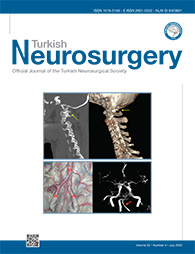2Akdeniz University School of Medicine, Department of Neurosurgery, Antalya, Turkey DOI : 10.5137/1019-5149.JTN.32559-20.4 AIM: To review both the surgical-related, and hardware-related adverse effects of deep brain stimulation (DBS) in a single center over the last five years.
MATERIAL and METHODS: All patients who underwent DBS electrode implantation at the Akdeniz University Hospital during the last five years participated in this study. Demographic information (sex, age, diagnosis, the duration between diagnosis and surgery, comorbid disease) and the date of surgery were collected from an electronic medical database. The adverse effects of DBS were classified into two: surgery-related and hardware-related effects, which were further subdivided based on whether they occurred intraoperatively, in the early postoperative stage, or over a long period time.
RESULTS: A database of 47 patients with 90 DBS electrode implants was analyzed in the study. The median age at the time of surgery of all patients was 54 years (range 11-75). Comorbid diseases were recorded in 16 (34%) patients. Out of the total, 33 patients (70.2%) had no adverse effects related to DBS. Surgical-related adverse effects were observed in five patients and of these, one haD an asymptomatic intracerebral hemorrhage (ICH), one had symptomatic ICH, one had both a seizure intraoperatively and an asymptomatic subdural hematoma whereas the other two had non-infectious peri-electrode edema. Hardware-related adverse effects were recorded in nine patients (19.1%). We recorded infections in six (12.7%) patients, erosion without infection in two (4.2%), and both lead fracture and lead malposition in one patient. All long-lasting adverse effects were hardware-related and recorded in eight (19%) patients.
CONCLUSION: DBS has been a well-established treatment for movement disorders but is associated with an increased risk of some adverse events which have been analyzed in this study.
Keywords : Deep brain stimulation, Hardware-related, Surgical-related, Complications, Infection, Peri-lead edema




